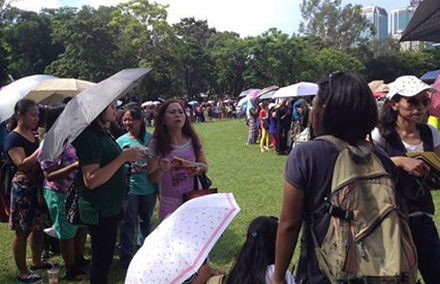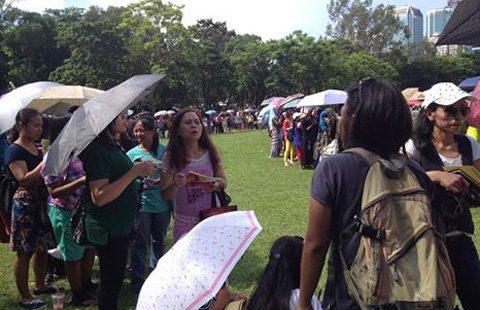
Thousands of Indonesians in Hong Kong patiently wait in line to cast their vote at Victoria Park on 6 July 2014. Photo by Answer Styannes.
As thousands of expat Indonesians went to the presidential polls over the weekend, it seems not everyone is getting their chance to vote, reports Answer Styannes.
It was incredibly hot and humid – typical Hong Kong weather at this time of year – when I arrived at Victoria Park to cast my vote for the Indonesian presidential election. I was not alone. Along with me, brandishing umbrellas and wearing sunglasses, were thousands of Indonesians waiting patiently in incredibly long lines. Most of them are Indonesians working as domestic workers in Hong Kong.
The air was full with enthusiasm. Everyone was very excited and busy taking selfies. Clearly, they saw the election as a celebration. Something they would like to remember.
But the minute I stepped into Victoria Park, I heard confused questions.
“Where is the entrance?”
“I’m not registered. What should I do?”
“Where did you get that yellow form?”
The yellow form was for unregistered voters. I had to explain to some fellow expats that there was a lady walking around distributing it and suggested them to stand in the queue in the meantime.
Registered voters mixed with unregistered voters in the same queue. They moved to a separate queue only after the migrant workers who had already casted their votes told them to do so.
The voters were educating each other voting procedure, as the presence of the Overseas Election Committee (PPLN) members was oddly sparse.
The polling station only had one entrance to the voting booth. With thousands of voters queuing for a single entrance, it’s not surprising that it took a long time to reach the polling station (TPS). I myself queued for about 90 minutes. At the entrance, a PPLN member explained that “registered voters should go straight to the polling station”. Too bad the thousands queuing in Victoria Park couldn’t hear.
Things went smoothly once I passed the entrance. I had my Hong Kong ID checked and registered, and was directed to one of the 13 TPS available where I casted my vote. It was around 4 pm, and the queue was still very long.
While I was fortunate to be able to cast my vote, this is not the case for around 300-500 eligible voters who were still in the queue an hour later.
PPLN shut down the TPS stating that the Hong Kong authorities had only approved the use Victoria Park until 5 pm. Voters did not find this plausible. There have been many instances where activities in Victoria Park went on until 7 pm. The Indonesian migrant worker groups know this very well. They regularly hold their big activist events on the Victoria Park’s grassy oval, or the lapangan rumput, or anniversaries.
The voters refused to accept that the TPS was closed after having waited for so many hours. The voters protested and demanded the TPS be re-opened.
In the midst of this protest, Commissioner of the Election Committee (KPU) Sigit Pamungkas allegedly made the controversial remarks that the “TPS will be re-opened only if the rest of the voters vote for Number 1”.
This incensed voters, who mostly seemed to be Jokowi supporters. Rumours flew that the premature closing of the TPS was a deliberate ploy to sabotage the Jokowi vote. Some migrant workers also claimed that they were instructed by the election crews at the TPS to vote for Prabowo.
Sigit Pamungkas is himself an interesting choice for the KPU. An article in Merdeka.com dated 20 March 2012, cast doubts on Sigit Pamungkas’s ability to stay neutral in the 2014 election. Pamungkas, who is also a lecturer at Gajah Mada University, is reportedly close to Golkar, the Demokrat, and the National Awakening Party (PAN).
Witnessing the messy administration of such election, one may come to the easy conclusion that PPLN was simply incompetent. Yet now there have been allegations that the election administration – and even the KPU Commissioner himself – have instructed and influenced the voters, it is difficult not to wonder if PPLN’s ‘incompetence’ (their failure to provide adequate information on the election and to anticipate a huge number of voters, as well as the early shut down of the TPS) was deliberate.
It is indeed intriguing that the PPLN decided to only provide 13 polling stations in Hong Kong, home of over 114,000 Indonesian registered voters. In Singapore where the election also took place on 6 July 2014, there were 36 polling stations provided, even though there are ‘only’ around 108,000 registered voters.
There are questions on what happened in the Indonesia presidential election in Hong Kong need to be answered.
But what is known for sure is that there are hundreds of Indonesians who have lost their right to vote, and such right needs to be restored. The list of witnesses, who heard in person the controversial remarks allegedly made by Sigit Pamungkas, has been made and will be forwarded to the Elections Supervisory Committee (Panwaslu) for their further investigation.
It is not only the Committee that is being tested. It is Indonesia democracy.
—
Answer Styannes works for human rights and lives in Hong Kong.
 Facebook
Facebook  Twitter
Twitter  Soundcloud
Soundcloud  Youtube
Youtube  Rss
Rss 